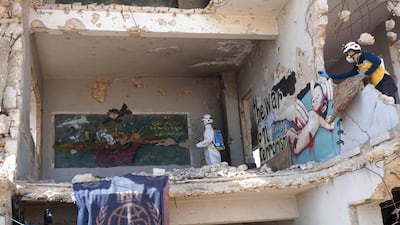The UAE offered to help Syria battle the coronavirus pandemic during a phone call between Sheikh Mohamed bin Zayed, Crown Prince of Abu Dhabi and Deputy Supreme Commander of the UAE Armed Forces, and Syrian President Bashar Al Assad to discuss the global crisis.
Sheikh Mohamed told the Syrian leader their countries needed to “place humanitarian solidarity over political issues during this common challenge we are all facing,” said the report by the UAE state news agency Wam.
Syria “will not be left alone during these delicate and critical circumstances”, Wam quoted him as telling Mr Al Assad.
The UAE’s outreach is despite a cooling of relations with Syria since an uprising against Mr Al Assad’s rule sparked a civil war that is now in its 10th year. The UAE, which backed opposition groups earlier in the conflict, reopened its Damascus embassy in December 2018 as Mr Al Assad’s government reasserted control over most of the country.
Syria has reported only five cases of the novel coronavirus infection, far fewer than most countries in the region, but there are fears that the large number of displaced civilians living in crowded camps and the government’s limited healthcare resources could lead to a rapid spread of Covid-19, the respiratory disease caused by the virus.
Dr Anwar Gargash, the UAE Minister of State for Foreign Affairs, said the coronavirus pandemic required “unprecedented steps” and that Sheikh Mohamed’s call to the Syrian president was made in this context.
“The human dimension has priority and the strengthening of the Arab role reflects the UAE’s direction; a courageous step towards the brotherly Syrian people that goes beyond narrow political calculations,” Dr Gargash wrote on Twitter.
Syria said on Friday it was banning travel between cities and governorates as part of tightening measures to curb the spread of coronavirus, state-run Ikhbariya TV reported, citing the interior minister.
The travel restriction, effective from Sunday, is on top of a curfew announced this week from 6pm to 6am and after the country halted flights and ordered most businesses to close.
Humanitarian agencies say they are particularly concerned about the virus spreading in the north-west, the last region in which opposition groups hold significant territory. About one million people have been displaced by government offensive launched in December, with most living in tightly packed camps near the Turkish border with severely limited access to healthcare.
Syria and seven other countries under unilateral sanctions, mainly from the United States and European Union, has urged UN Secretary General Antonio Guterres to request the immediate and complete lifting of those measures to enable them to respond to the pandemic.
In a joint letter obtained by The Associated Press, the ambassadors from China, Cuba, North Korea, Iran, Nicaragua, Russia, Syria and Venezuela urged the UN chief to “reject the politicisation of such a pandemic”.
The ambassadors, who said they were under instructions from their foreign ministers, did not name any countries responsible for what they called “illegal, coercive measures of economic pressure”. But the US has imposed sanctions on every one of the nations except China, and the EU has imposed sanctions on all but Cuba.








